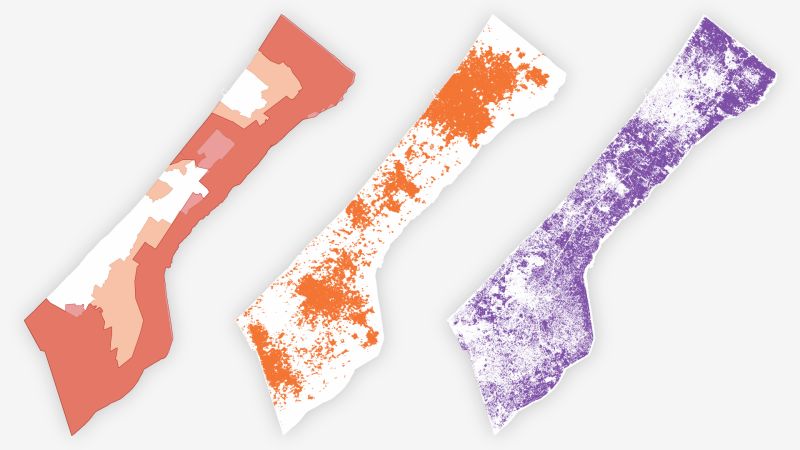The Geography Of Displacement: How Israel's Gaza Policy Restricts Palestinian Movement

Welcome to your ultimate source for breaking news, trending updates, and in-depth stories from around the world. Whether it's politics, technology, entertainment, sports, or lifestyle, we bring you real-time updates that keep you informed and ahead of the curve.
Our team works tirelessly to ensure you never miss a moment. From the latest developments in global events to the most talked-about topics on social media, our news platform is designed to deliver accurate and timely information, all in one place.
Stay in the know and join thousands of readers who trust us for reliable, up-to-date content. Explore our expertly curated articles and dive deeper into the stories that matter to you. Visit Best Website now and be part of the conversation. Don't miss out on the headlines that shape our world!
Table of Contents
The Geography of Displacement: How Israel's Gaza Policy Restricts Palestinian Movement
The besieged coastal strip of Gaza is a stark illustration of how geopolitical policy can severely limit human movement and fundamentally reshape the geography of daily life. For over a decade, Israel's control over Gaza's borders, airspace, and even its coastal waters has created a complex web of restrictions impacting nearly every aspect of Palestinian life, from accessing essential goods to pursuing education and employment opportunities. This article examines the multifaceted ways Israel's Gaza policy directly restricts Palestinian movement, contributing to a cycle of displacement and hardship.
The Closed Border: A Physical Barrier to Freedom
Israel's blockade of Gaza, imposed since Hamas’ takeover in 2007, significantly restricts the flow of people and goods. The borders are largely closed, severely limiting the ability of Palestinians to leave Gaza for work, education, medical treatment, or family visits. This physical restriction creates a captive population, unable to escape the confines of a densely populated territory facing chronic shortages of resources. The limited number of crossing points are often subject to unpredictable closures, adding to the uncertainty and hardship faced by Gazans. These closures are often triggered by security concerns, but their frequent and unpredictable nature severely impacts the lives of ordinary Palestinians.
The Sea and the Sky: Restricted Access, Restricted Lives
The blockade isn't limited to land borders. Israel also restricts access to Gaza's territorial waters, hindering the fishing industry, a crucial source of livelihood for many Gazans. The permitted fishing zone is often dramatically reduced, leading to economic hardship and food insecurity. Similarly, airspace restrictions severely limit travel and trade, further isolating Gaza from the outside world. These limitations aren't merely inconvenient; they're existential threats to the economic viability of the region and the well-being of its people.
Internal Movement: Navigating a Fractured Landscape
Even within Gaza, movement is not free. The internal geography of the territory is shaped by checkpoints, security barriers, and the ever-present threat of conflict. This internal fragmentation restricts access to essential services, healthcare, and education, particularly for those living in remote areas. The constant fear of violence further limits the ability of Palestinians to move freely within their own territory.
The Human Cost: Displacement and Despair
The cumulative effect of these restrictions is a profound sense of displacement and despair. The inability to move freely, to access opportunities, and to participate fully in the global community has created a humanitarian crisis. The psychological toll of living under constant restrictions is immense, leading to increased rates of mental health issues and a sense of hopelessness among the population. This situation is further exacerbated by the ongoing conflict and the lack of long-term solutions.
International Implications and Calls for Action
The situation in Gaza highlights the complex interplay between geopolitical strategy and human rights. International organizations and human rights groups have consistently condemned Israel's blockade, highlighting its disproportionate impact on civilians and its violation of international humanitarian law. The international community must exert pressure on all involved parties to ensure that the movement of Palestinians is not unduly restricted and that their fundamental human rights are respected. This requires a long-term commitment to addressing the root causes of the conflict and finding a just and lasting solution to the crisis. The geography of displacement in Gaza is not immutable; it's a product of policy choices, and those choices can be changed.
Further Reading:
- [Link to UNRWA report on Gaza]
- [Link to Human Rights Watch report on Gaza]
Call to Action: Learn more about the humanitarian crisis in Gaza and advocate for policies that promote human rights and freedom of movement for Palestinians.

Thank you for visiting our website, your trusted source for the latest updates and in-depth coverage on The Geography Of Displacement: How Israel's Gaza Policy Restricts Palestinian Movement. We're committed to keeping you informed with timely and accurate information to meet your curiosity and needs.
If you have any questions, suggestions, or feedback, we'd love to hear from you. Your insights are valuable to us and help us improve to serve you better. Feel free to reach out through our contact page.
Don't forget to bookmark our website and check back regularly for the latest headlines and trending topics. See you next time, and thank you for being part of our growing community!
Featured Posts
-
 Newly Discovered Mayan Complex Pyramids And Canals Dating Back 3 000 Years
Jun 01, 2025
Newly Discovered Mayan Complex Pyramids And Canals Dating Back 3 000 Years
Jun 01, 2025 -
 Qualifying Recap Aston Martins Performance At The Spanish Gp
Jun 01, 2025
Qualifying Recap Aston Martins Performance At The Spanish Gp
Jun 01, 2025 -
 Bondi Stabbing System Failures Exposed In Joel Cauchis Case
Jun 01, 2025
Bondi Stabbing System Failures Exposed In Joel Cauchis Case
Jun 01, 2025 -
 Colleagues Friends Offer Support To Sheinelle Jones After Uche Ojehs Funeral
Jun 01, 2025
Colleagues Friends Offer Support To Sheinelle Jones After Uche Ojehs Funeral
Jun 01, 2025 -
 Trans Student At Heart Of Trumps California Funding Threat What We Know
Jun 01, 2025
Trans Student At Heart Of Trumps California Funding Threat What We Know
Jun 01, 2025
